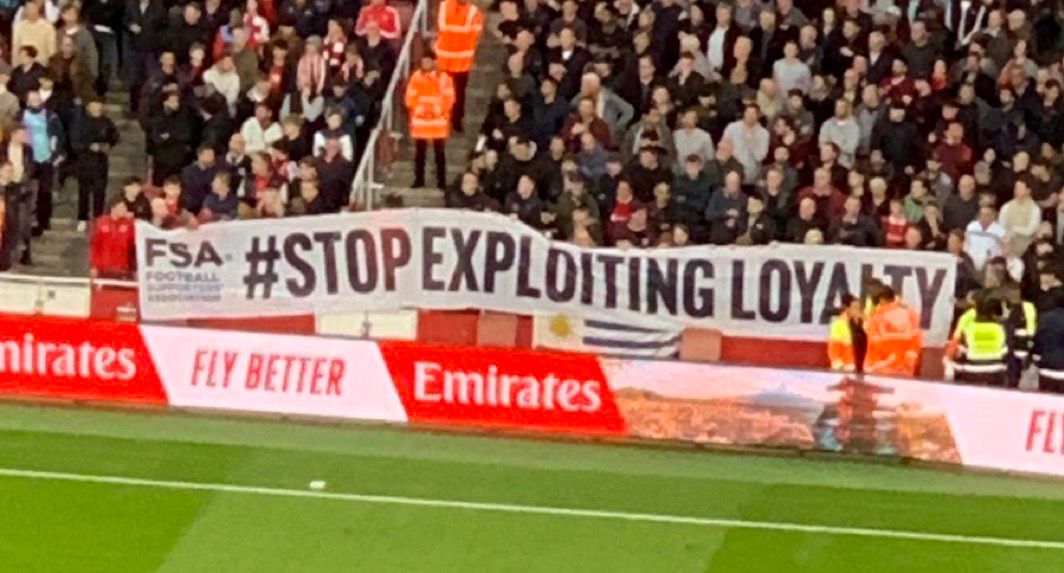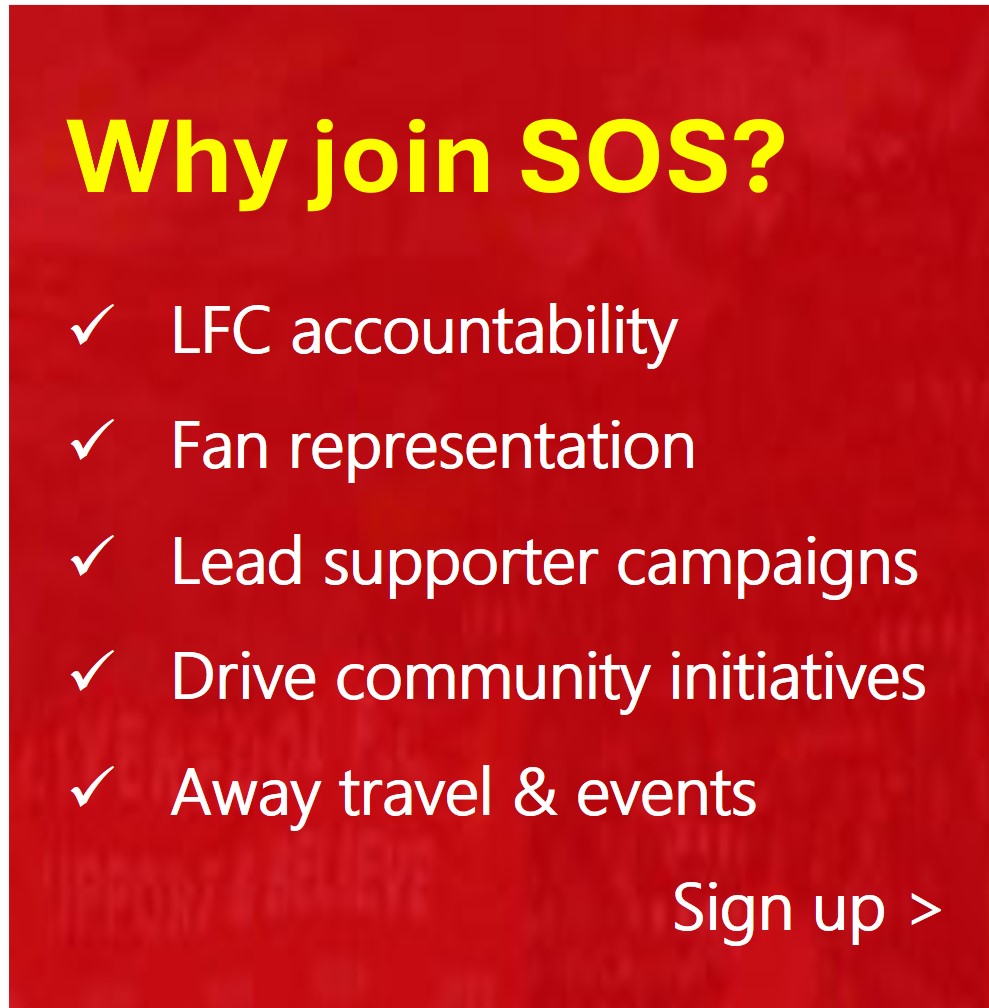
Why Spirit of Shankly Are Supporting the Stop Exploiting Loyalty Campaign

By Gareth Roberts, Spirit of Shankly
This article first appeared in Red All Over The Land – the last remaining printed Liverpool FC fanzine. Find out more here and follow them on Twitter here.
IF you’ve taken the time to buy this fanzine today, it’s likely you already value football as much more than just a game or another form of entertainment.
It’s a fair bet you value fan culture; that you care about the collective and that you want Anfield to have the best atmosphere – full of banners, flags and passionate, driven supporters who play an active part in what unfolds on the pitch.
For us, it’s not like going to see a film, watching a play or flicking through Netflix. It’s not an event, or a product, or a project – or any of the other corporate-speak terms that have increasingly crept into the game over the years. It’s definitely not, as former Liverpool co-owner Tom Hicks once described our club, “like Weetabix”.
For so many of us, football is a way of life, a tradition passed down through generations. Something that has not only punctuated our existence, but defined it. In recent years, however, the essence of what makes football great has been under threat.
The relentless rise in ticket prices – which has far outsripped inflation for decades – has made attending matches unaffordable for many, with loyal supporters being priced out of their own stadiums. Who doesn’t know “a good Red” who can longer afford to attend regularly at Anfield?
In 1990, a ticket to stand on the Kop cost £4. Today, that same ticket costs £39, an increase of 875 percent. Compare that with everyday essentials: a loaf of bread has risen from 50p to £1.40 (a 180 percent increase) and a pint of lager from £1.21 to £4.77 (a 294 percent increase). If those essentials had risen in line with ticket prices, we’d be paying nearly £5 for a loaf and over £11.50 for a pint.
#StopExploitingLoyalty pic.twitter.com/PBaxjXmj2m
— Spirit of Shankly (@spiritofshankly) November 30, 2024
The grounds might be full – a common argument made by the moneymen – but it feels like there is a race to the richest in terms of who is filling them. Boardrooms are increasingly creating a situation where football is becoming a luxury, accessible only to those with the deepest pockets.
The recent direction of travel hasn’t been a good one. Only one club in the Premier League, Crystal Palace, refrained from increasing ticket prices this season.
Even worse, several clubs, including West Ham United, Nottingham Forest and Tottenham, have begun targeting concessions, including the youngest, oldest and disabled supporters. Where does it end, and what of inclusivity?
There’s more. Last December, Premier League football was played on Christmas Eve for the first time in 28 years when Wolves played Chelsea at Molineux – with zero consideration for fans’ travel needs.
The push for Premier League games being played abroad also remains, with our club’s chairman, Tom Werner, publicly dreaming of a “Premier League game played in New York City”, adding: “I even have the sort of crazy idea that there would be a day where we play one game in Tokyo, one game a few hours later in Los Angeles, one game a few hours later in Rio, one game a few hours later in Riyadh and make it sort of a day where football, where the Premier League, is celebrated.”
This corporate ambition disregards the supporters who have made the game what it is, reducing it to a commodity, a global product devoid of community ties.
In response to this growing disconnect, Spirit of Shankly (SOS), along with the Football Supporters Association (FSA) and other fan groups, has been at the forefront of the Stop Exploiting Loyalty campaign.
SOS has been proud to take a leading role in the campaign, having first proposed the motion to The FSA, demonstrating our commitment to addressing the exploitation of fans.
The campaign was born out of frustration and anger over the blatant disregard for the very people who have made the game what it is today.
It’s a rallying cry for all football fans to stand together, demand change and amplify the message that enough is enough.
The Power of Collective Action
The strength of the Stop Exploiting Loyalty campaign lies in its unity. In recent weeks, banners featuring the campaign’s message have been displayed at Premier League matches up and down the country.
From Anfield to Craven Cottage, fans have joined forces to make their voices heard. The solidarity shown by supporters, regardless of which team they follow, has been a powerful reminder that there is strength in unity.
At Anfield, the banner was displayed before Liverpool’s 2-1 win over Brighton, with both Liverpool and Brighton supporters holding it up outside The Kop, while SOS members proudly displayed it inside the ground before kick-off.
This show of solidarity was repeated at recent matches against Arsenal and West Ham, as well as at Goodison Park before Everton’s Premier League clash with Fulham.
Co-ordinated action between Liverpool, Manchester City, Manchester United and Everton supporters was covered extensively by the mainstream media and the message has spread far and wide, reaching millions of fans through leafleting, TV broadcasts, social media, and direct action at matches.
“We’re being slightly gaslighted by our own clubs…” 🤦♂️
The cost of loyalty: are ticket prices going too far? 📈 pic.twitter.com/Qj7cQVpqWm
— The Overlap (@WeAreTheOverlap) November 30, 2024
A Message to Football’s Decision Makers
The core message of the campaign is simple: football is becoming increasingly elitist, and it is pricing out the loyal fans who have supported their teams for years. The rise in ticket prices, particularly for younger and older fans, has led to a situation where many of those who have been attending matches for decades are being forced to choose between paying their bills and watching their team.
This issue is not limited to Liverpool or any other single club – it is a systemic problem within the Premier League as a whole.
There has been dialogue with both the club and the Premier League, urging them to take action to protect the interests of fans.
Liverpool’s stance on tickets for next season is expected to be communicated early in the new year.
As fans, we know that our collective voices have the power to create change. We have seen this throughout history, from the protests against the European Super League in April 2021 to the successful campaign to cap away ticket prices at £30, which has been in place since the 2016-17 season.
When supporters unite and demand action, the decision-makers in football listen – they take the temperature of supporter feeling all the time. Shrug and wave things through, and things will only get worse.
📍Walton Breck Road #StopExploitingLoyalty pic.twitter.com/yHvhE5ladv
— Spirit of Shankly (@spiritofshankly) December 1, 2024
The History of Fan Protests
The power of fan protests to bring about change in football is not new. At Liverpool, we have a long history of standing up for what’s right. From the protests against the ownership of Tom Hicks and George Gillett that ultimately forced them out of our club to the unprecedented walkout against Sunderland over the threat of £77 tickets at Anfield, Liverpool fans have consistently been at the forefront of pushing back against decisions that threaten the integrity of the game.
In 2016, widespread opposition to proposed price hikes culminated in black flags on The Kop and 10,000 walking out of the ground on the 77th minute – the first walk out in the club’s history.
Liverpool’s owners made a dramatic U-turn, announcing that ticket prices would not rise for the following two seasons.
This was a victory for fans, proving that when we come together, we can make a difference. But the fight is far from over, and prices are on the rise once more.
Owners then prioritised an additional £2 million in ticket revenue over the goodwill of supporters before rowing back. Now, at Liverpool, we are looking at the prospect of a third consecutive season of price hikes at Anfield.
You can be sure that the presence of, and support for, organisations like Spirit of Shankly and the Football Supporters Association keeps a tether on prices being even higher than they already are.
#MCFC and #LFC fans’ joint protest over ticket prices in @WeAreTheFSA campaign #StopExploitingLoyalty pic.twitter.com/Rl2lz77Ph5
— Henry Winter (@henrywinter) December 1, 2024
The Blueprint for Football
Ticket prices and the growing divide between the wealthy elite and the everyday fan are part of a much bigger picture.
For decades, the Premier League has been increasingly driven by financial interests, with clubs prioritising profit over the well-being of supporters and fan culture.
Back in 2013, Richard Scudamore, then the Premier League chief executive, suggested loyal supporters who have traditionally attended matches week in, week out were not a priority in conversations about ticket pricing.
He said: “It means making sure that the local people that live and breathe and work around the clubs are able to go and watch those teams, not every week perhaps, but certainly on an occasional basis.”
This attitude was echoed in the European Super League proposal, with the BBC reporting that some involved referred to traditional supporters as “legacy fans” while they focused on “fans of the future” – wealthier, global consumers willing to pay top dollar for a “matchday experience”.
When did what has been the lifeblood of a club become an inconvenience?
Ironically, when it comes to Liverpool, much of the marketing to these consumers will focus on an “unique atmosphere”, often with pictures of flags and banners on The Kop – and all without a hint of irony as one slowly kills the other.
Our game was repackaged and sold to the highest bidders. It was always the plan. The FA’s The Blueprint For The Future Of Football in 1991 provides the evidence.
Early on in the document, in a section headed ‘The Social Context in England’ average earnings of the average man and woman in the UK are detailed.
The report says: “Although our analysis suggests that there will be a significant minority of consumers whose purchase and participation decisions continue to be driven by price, the mass dynamic will be toward a more affluent consumer possessing more of what, historically, have been thought of as ‘middle class’ aspirations and values.”
It later adds: “The implication is that hard choices have to be made as to the consumer segment to which the offer is to be targeted, and hence the ingredients of that offer.
“The response of most sectors has been to move upmarket so as to follow the affluent ‘middle class’ consumer in his or her pursuits and aspirations.
“We strongly suggest that there is a message in this for football, and particularly for the design of stadia for the future.”
Sounds a lot like the Anfield Road’s Brodies Lounge: padded seats, “street food” and a “complimentary” programme and half-time drink – all for a mere £500 per match, per person.
Clubs listen to fans when we stand together. Unity is strength. ✊🏼
If you’re worried about rising ticket prices or cuts to concessions in the Premier League, join our short peaceful protest today.#StopExploitingLoyalty💰
📍 Kop/KD Stand corner, 3pm pic.twitter.com/yq3iJ32Yrq
— Spirit of Shankly (@spiritofshankly) December 1, 2024
The Role of Spirit of Shankly
Spirit of Shankly has been a voice for fans since 2008. Our mission is to ensure that supporters are not excluded from the game they helped shape. We want the club, the sport, and the community to remain intertwined. We’ve been successful before and we will be again.
The Stop Exploiting Loyalty campaign is an important step in defending the traditional fan. SOS will continue to stand strong in the face of these challenges, but we need you to help ensure we don’t lose the essence of what makes football — our football — so special.
Your support is vital. Your voice matters. Join us in standing up for the fans and taking a stand against the exploitation of loyalty in football.
Go to: spiritofshankly.com/join and become a free supporter of SOS or sign up for our annual membership to have a say in how SOS is run.





